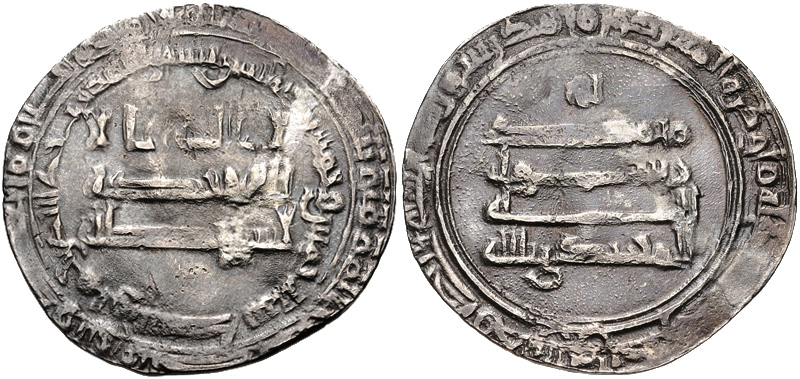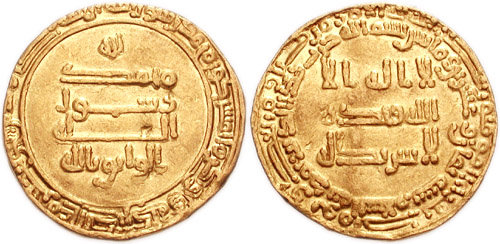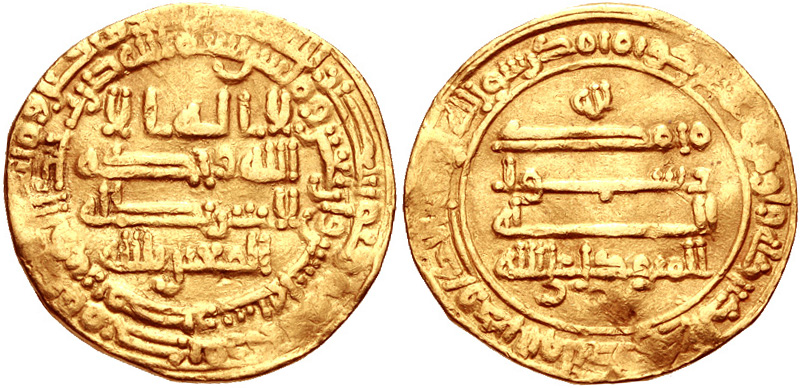|
Al-Muhtadi
Abū Isḥāq Muḥammad ibn al-Wāthiq ( ar, أبو إسحاق محمد بن هارون الواثق; – 21 June 870), better known by his regnal name Al-Muhtadī bi-'llāh (Arabic: , "Guided by God"), was the Caliph of the Abbasid Caliphate from July 869 to June 870, during the "Anarchy at Samarra". Early life Al-Muhtadi was the son of Abbasid caliph al-Wathiq. He was born in 833. Al-Muhtadi's mother was Qurb, a Greek slave. After the death of his father, Caliph al-Wathiq () in August 847, there were some officials who wanted to elect the young al-Muhtadi as caliph, but in the end, their choice fell on his uncle, al-Mutawakkil (). Background Despite the successes of caliph al-Mu'tazz, He could not overcome the main problem of the period: a shortage of revenue with which to pay the troops. The financial straits of the Caliphate had become evident already at his accession—the customary accession donative of ten months' pay for the troops had to be reduced to two for la ... [...More Info...] [...Related Items...] OR: [Wikipedia] [Google] [Baidu] |
Anarchy At Samarra
The Anarchy at Samarra () was a period of extreme internal instability from 861 to 870 in the history of the Abbasid Caliphate, marked by the violent succession of four caliphs, who became puppets in the hands of powerful rival military groups. The term derives from the then capital and seat of the caliphal court, Samarra. The "anarchy" began in 861, with the murder of Caliph al-Mutawakkil by his Turkish guards. His successor, al-Muntasir, ruled for six months before his death, possibly poisoned by the Turkish military chiefs. He was succeeded by al-Musta'in. Divisions within the Turkish military leadership enabled Musta'in to flee to Baghdad in 865 with the support of some Turkish chiefs (Bugha the Younger and Wasif) and the Police chief and governor of Baghdad Muhammad, but the rest of the Turkish army chose a new caliph in the person of al-Mu'tazz and besieged Baghdad, forcing the city's capitulation in 866. Musta'in was exiled and executed. Mu'tazz was able and energetic, ... [...More Info...] [...Related Items...] OR: [Wikipedia] [Google] [Baidu] |
Abbasid Dynasty
The Abbasid dynasty or Abbasids ( ar, بنو العباس, Banu al-ʿAbbās) were an Arab dynasty that ruled the Abbasid Caliphate between 750 and 1258. They were from the Qurayshi Hashimid clan of Banu Abbas, descended from Abbas ibn Abd al-Muttalib. The Abbasid Caliphate is divided into three main periods: Early Abbasid era (750–861), Middle Abbasid era (861–936) and Later Abbasid era (936–1258). A cadet branch of the dynasty also ruled as ceremonial rulers for the Mamluk Sultanate as Caliph (1261–1517), until their conquest by the Ottoman Empire. Ancestry The Abbasids descended from Abbas, one of Muhammad's companions (as well as his uncle) and one of the early Qur'an scholars. Therefore, their roots trace back to Hashim ibn 'Abd Manaf and also Adnan in the following line: Al-‘Abbas ibn Abdul-Muttalib ibn Hashim ibn Abd Manaf ibn Qusai ibn Kilab ibn Murrah ibn Ka'b ibn Lu'ay ibn Ghalib ibn Fihr ibn Malik ibn An-Nadr ibn Kinanah ibn Khuzaima ibn Mudrika ... [...More Info...] [...Related Items...] OR: [Wikipedia] [Google] [Baidu] |
Al-Wathiq
Abū Jaʿfar Hārūn ibn Muḥammad ( ar, أبو جعفر هارون بن محمد المعتصم; 17 April 812 – 10 August 847), better known by his regnal name al-Wāthiq bi’llāh (, ), was an Abbasid caliph who reigned from 842 until 847 AD (227–232 AH in the Islamic calendar). Al-Wathiq is described in the sources as well-educated, intellectually curious, but also a poet and a drinker, who enjoyed the company of poets and musicians as well as scholars. His brief reign was one of continuity with the policies of his father, al-Mu'tasim, as power continued to rest in the hands of the same officials whom al-Mu'tasim had appointed. The chief events of the reign were the suppression of revolts: Bedouin rebellions occurred in Syria in 842, the Hejaz in 845, and the Yamamah in 846, Armenia had to be pacified over several years, and above all, an abortive uprising took place in Baghdad itself in 846, under Ahmad ibn Nasr al-Khuza'i. The latter was linked to al-Wathiq's continu ... [...More Info...] [...Related Items...] OR: [Wikipedia] [Google] [Baidu] |
Abbasid Samarra
Samarra is a city in central Iraq, which served as the capital of the Abbasid Caliphate from 836 to 892. Founded by the caliph al-Mu'tasim, Samarra was briefly a major metropolis that stretched dozens of kilometers along the east bank of the Tigris, but was largely abandoned in the latter half of the 9th century, especially following the return of the caliphs to Baghdad. Due to the relatively short period of occupation, extensive ruins of Abbasid Samarra have survived into modern times. The layout of the city can still be seen via aerial photography, revealing a vast network of planned streets, houses, palaces and mosques. Studies comparing the archeological evidence with information provided by Muslim historians have resulted in the identification of many of the toponyms within the former city. The archeological site of Samarra was named by UNESCO as a World Heritage Site in 2007, calling it "the best-preserved plan of an ancient large city." The modern city bearing the same na ... [...More Info...] [...Related Items...] OR: [Wikipedia] [Google] [Baidu] |
Al-Mu'tazz
Abū ʿAbd Allāh Muḥammad ibn Jaʿfar ( ar, أبو عبد الله محمد بن جعفر; 847 – 16 July 869), better known by his regnal title al-Muʿtazz bi-ʾllāh (, "He who is strengthened by God") was the Abbasid caliph from 866 to 869, during a period of extreme internal instability within the Abbasid Caliphate, known as the "Anarchy at Samarra". Originally named as the second in line of three heirs of his father al-Mutawakkil, al-Mu'tazz was forced to renounce his rights after the accession of his brother al-Muntasir, and was thrown in prison as a dangerous rival during the reign of his cousin al-Musta'in. He was released and raised to the caliphate in January 866, during the civil war between al-Musta'in and the Turkish military of Samarra. Al-Mu'tazz was capable and determined to reassert the authority of the caliph over the Turkish military, but had only limited success. Aided by the vizier Ahmad ibn Isra'il, he managed to remove and kill the leading Turkish gene ... [...More Info...] [...Related Items...] OR: [Wikipedia] [Google] [Baidu] |
Al-Mu'tamid
Abu’l-ʿAbbās Aḥmad ibn Jaʿfar ( ar, أبو العباس أحمد بن جعفر; – 14 October 892), better known by his regnal name Al-Muʿtamid ʿalā ’llāh (, "Dependent on God"), was the Caliph of the Abbasid Caliphate from 870 to 892. His reign marks the end of the "Anarchy at Samarra" and the start of the Abbasid restoration, but he was largely a ruler in name only. Power was held by his brother al-Muwaffaq, who held the loyalty of the military. Al-Mu'tamid's authority was circumscribed further after a failed attempt to flee to the domains controlled by Ahmad ibn Tulun in late 882, and he was placed under house arrest by his brother. In 891, when al-Muwaffaq died, loyalists attempted to restore power to the Caliph, but were quickly overcome by al-Muwaffaq's son al-Mu'tadid, who assumed his father's powers. When al-Mu'tamid died in 892, al-Mu'tadid succeeded him as caliph. Life The future al-Mu'tamid was a son of Caliph al-Mutawakkil () and a Kufan slave girl c ... [...More Info...] [...Related Items...] OR: [Wikipedia] [Google] [Baidu] |
Al-Mutawakkil
Abū al-Faḍl Jaʿfar ibn Muḥammad al-Muʿtaṣim bi-ʾllāh ( ar, جعفر بن محمد المعتصم بالله; March 822 – 11 December 861), better known by his regnal name Al-Mutawakkil ʿalā Allāh (, "He who relies on God") was the tenth Abbasid caliph. He succeeded his brother, al-Wathiq, and is known for expanding the empire to its maximum extent. He was deeply religious, and is remembered for discarding the Muʿtazila, ending the Mihna (a period of persecution of Islamic scholars), and releasing Ahmad ibn Hanbal. He is also known for his tough rule, especially with respect to non-Muslim subjects. He was assassinated on 11 December 861 by the Turkic guard with the support of his son, al-Muntasir, marking the beginning of the period of civil strife known as the " Anarchy at Samarra". Early life Al-Mutawakkil was born on February/March 822 to the Abbasid prince Abu Ishaq Muhammad (the future al-Mu'tasim) and a slave concubine from Khwarazm called Shuja ... [...More Info...] [...Related Items...] OR: [Wikipedia] [Google] [Baidu] |
Donative
The ''donativum'' (plural ''donativa'') was a gift of money by the Roman emperors to the soldiers of the Roman legions or to the Praetorian Guard. The English translation is '' donative''. The purpose of the ''donativa'' varied. Some were expressions of gratitude for favors received, and others outright bribery for favours expected in return. ''Donativa'' were normally rendered at the beginning of each new emperor's reign. During the 2nd and 3rd centuries, that form of bribery became a crucial part of any successful ruler in Rome. Such was the case with many of the soldier-emperors from 235 to 248. The Praetorian Guard, intimate to the emperor's person, was an even greater threat to security. The cohorts stationed in Rome were difficult to appease and quick to assassinate. The ''donativum'' thus provided a significant way to purchase the Guard's support and loyalty. Emperor Augustus bequeathed the Praetorian Guard a substantial sum in his will, but it was not until the reign of ... [...More Info...] [...Related Items...] OR: [Wikipedia] [Google] [Baidu] |
Al-Musta'in
Abū al-ʿAbbās Aḥmad ibn Muḥammad ibn Muḥammad ( ar, أبو العباس أحمد بن محمد بن محمد; 836 – 17 October 866), better known by his regnal title Al-Mustaʿīn (836 – 17 October 866) was the Abbasid caliph from 862 to 866, during the " Anarchy at Samarra". After the death of previous Caliph, Al-Muntasir (who had not appointed any successors), the Turkic military leaders held a council to select his successor. They were not willing to have Al-Mu'tazz or his brothers; so they elected ''Ahmad ibn Muhammad'' (), a nephew of Al-Mutawakkil, who took the regnal name Al-Mustaʿīn bi-ʾllāh ( "he who looks for help to God"). Arab and other troops based in Baghdad, displeased at the choice, attacked the assembly, broke open the prison, and plundered the armory. They were attacked by the Turkic and Berber soldiers, and after some fighting in which many died, succumbed. Baghdad had yet to learn that the Caliphate no longer depended on the opinions of th ... [...More Info...] [...Related Items...] OR: [Wikipedia] [Google] [Baidu] |
Abbasid Civil War (865–866)
The Abbasid civil war of 865–866, sometimes known as the Fifth Fitna, was an armed conflict during the " Anarchy at Samarra" between the rival caliphs al-Musta'in and al-Mu'tazz, fought to determine who would gain control over the Abbasid Caliphate. The war, which lasted for about a year, largely revolved around a prolonged siege of Baghdad and ended with al-Mu'tazz as sole caliph. Al-Musta'in was abandoned by his supporters and forced to abdicate; in spite of a guarantee that his life would be spared, he was executed shortly afterward. The outcome of the war was a major victory for the Turkic military establishment, which had been responsible for al-Mu'tazz's rise to power, and allowed the Turks to maintain their effective power over the government and military of the caliphate. The partisans of al-Musta'in, namely the Tahirid family, the Arab military factions, and the citizens of Baghdad, continued to be excluded from the politics of the central government after their s ... [...More Info...] [...Related Items...] OR: [Wikipedia] [Google] [Baidu] |
Ubaydallah Ibn Abdallah Ibn Tahir
Abu Ahmad Ubaydallah ibn Abdallah ibn Tahir ( ar, أبو أحمد عبيد الله بن عبد الله بن طاهر, c. 838 – May 913) was a ninth century Tahirid official and military officer. He was the last major Tahirid to hold high office, having served as the governor of Baghdad at various points between 867 and 891. Career Ubaydallah was the son of Abdallah ibn Tahir, the governor of Khurasan from 828 to 845. During the civil war of 865–866 he was present in Baghdad, and throughout the siege of the city he served in a military capacity under his brother Muhammad ibn Abdallah ibn Tahir, who as governor commanded the overall defense against the besiegers. At the end of the war, he was responsible for transferring the signet, cloak and scepter of the defeated caliph al-Musta'in (r. 862–866) to the victor al-Mu'tazz (r. 866–869). Upon Muhammad's death in November 867, Ubaydallah assumed the governorship of Baghdad as his brother's designated successor, and he ... [...More Info...] [...Related Items...] OR: [Wikipedia] [Google] [Baidu] |








